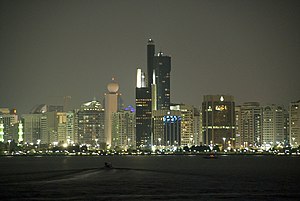I’ve let my contempt for Saudi Arabia’s current governing system be known – several times. This is because it’s a personality-centric system driven by personalities that most of you wouldn’t want to invite to dinner. In such systems, psychology matters when understanding certain events. Let’s take a walk through, shall we, and understand Saudi state psychology.
Mixing politics and religion is never a good idea
The primary role of religion is to answer the unanswerable; the primary role of political leadership is to organize societies into groups that can both fend off other organized societies and concurrently enrich a certain elite. That second part there is important – political systems tilt towards earthly rewards for those at the top. Heavy is the head that wears the crown, may as well have some virgins thrown in to alleviate, you know? So goes the thinking.

Glaring for a reason.
Politics inherently perverts religion because the goals are entirely different. One cannot strive for all the answers to the universe on the same day as one plots against a neighbor. Those are very different conversations. Because politics focuses on the earthly and immediate, any system that mixes the two pollutes religion with politics, rather than the other way around. If a system becomes too religious, in invariably collapses because it takes the eye off the main balls – defending society from other societies and enriching the top elites.
Of course, Saudi Arabia has mixed the two to pure madness
And has created a powerful state psychology hinged on the belief that any culture or religion outside its own is hellfire waiting to happen. Saudi security forces most likely believe all the tripe they’ve been fed and see anyone but themselves as infidels and impure. This makes pretty much everyone on Earth the enemy. Only Saudi royals rise above the fray and embrace infidels to save their kingdom. Several of them – Prince Bandar especially – are quite aware the existence of the kingdom is contingent on outside support.
This creates a mentality of zero-sum thinking
Saudi state psychology is grappling rather frantically to find footing in the wake of the U.S.-Iran nuclear deal. No, that deal’s not finished, and much may fuck up before the day is out, but the precedent – that the two supposedly intractable foes can agree on principles – is a massive threat to Saudi Arabia. Anything that strengthens a heretical power – Shi’a Iran – concurrently weakens Saudi Arabia. For those who believe the world should be more like them, there’s no reason for co-existence except when absolutely necessary.
Saudi Arabia would like to see the end of Shi’a Islam – not forcefully necessarily, but through mass conversions as millions wake up and realize Saudi Arabia and not Iran has always had the true version of Islam. The Iranian state is in the way of that; it stands to reason that its collapse, reduction or weakening would benefit Saudi Arabia’s religious designs.

Classy ads from classy people.
Conversely, Saudi Arabia sees Iran engaged in the same game – one for the souls of all Muslims. There can’t be a formal peace that says, you’re good, I’m good, we all good. Even if war is eradicated, the struggle for the soul of Islam will carry on through debate, schooling, and religious foundations. Whoever has the most money will stand a good chance of carrying the day.
And so Saudi Arabia seeks to shore up its power base by encouraging its neighbors to stop existing
In 2011, I asked my Emirati students if they liked King Abullah’s idea of a unified Gulf Co-Operation Council, which would in essence just be a “Greater Saudi Arabia.” Some of them said they were cool with it, since they were all good Muslims and what could go wrong? Others wanted to keep their country. Regardless, the proposal was met with tepid, “Oh, you,” responses from most Gulf capitals, rather than outright “no.”
Now the idea has come up again. Saudi Arabia has greater incentive than ever to absorb the Gulf states, which would, at a stroke, give it about 2/3rds of the world’s oil reserves. Even with America coming back into the game as an oil producer, such control would force the world to make sure Saudi Arabia stays stable and protected. Virtually any incentive to see the royals go would evaporate. It’s a helluva insurance policy.
As if anyone wants to go quietly into the night
Oman responded with a polite, but firm, fuck off. The Sultan probably knows his branch of Islam, Ibadism, would get short shrift in this new mega-state. With a state history much longer than Riyadh’s, Omanis also have a sense of self that wouldn’t be so easily swallowed.

The minority vote.
As for the other states, all of them fledgling in identity (save Bahrain), the idea most likely chills their leaders to the bone. To say no is dangerous; Saudi Arabia will only see that as a threat. But to say yes is more so; it means the end of their indigenous development programmes, some of which are decidedly un-Islamic. The careful nation-building that’s been under construction for over 40 years will come crashing down; moreover, if Saudi Arabia does spiral into chaos, it means these states will be sucked down into it.
It speaks volumes about Saudi Arabia’s state psychology
The rather remarkable arrogance of the move is classic Saudi royal family. ”We’re big, we’re rich, and nobody should threaten that,” is the thinking. Co-existence with Iran is quite possible if Saudi Arabia adopts an identity based on plurality and tolerance. But there’s approximately zero signs of that happening right now. If anything, they’re battening down the hatches and getting even more intolerant, seeing everything as a conspiracy to undo their shaky power.
It’s also self-defeating
Even if Saudi Arabia gets away with this power grab, it will only be a success if the United States allows it. The U.S. could easily neuter it in its early stages just by expressing disapproval.
But say Saudi Arabia manages despite that. All they’ve acquired is a set of states with low populations and high expectations and economies based on massive capital inflows. They don’t gain strategic depth – Iran could invade the Eastern Province just as easily as Dubai. If anything, it means expensive semi-occupations, where Saudi Arabia has to keep on bribing their new subjects at levels even greater than their former leaders to ensure their loyalty. And if one of them decides to quit this federation, how long ’til a contagion of revolution, secession, and state disintegration takes root?
So why bother?
Because Saudi Arabian state psychology won’t allow its leaders to sit still while Iran’s suddenly brought in from the cold. Any idea must be entertained, even if it’s a bad one. Alas, it’s the equivalent of a hungry kid grabbing up all the treats and gobbling them down early to prevent anyone else from eating them. Hardly an ideal scenario for running a state in the 21st century.



